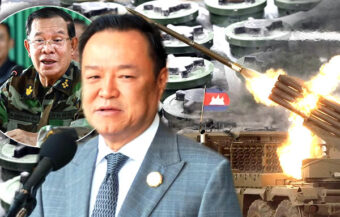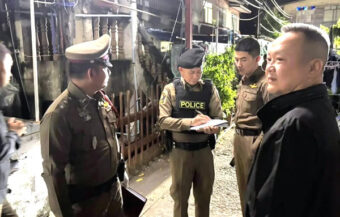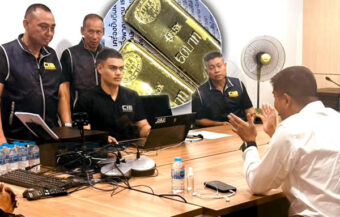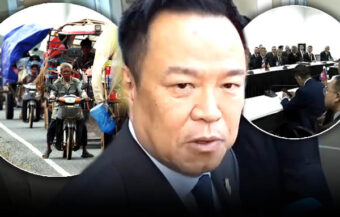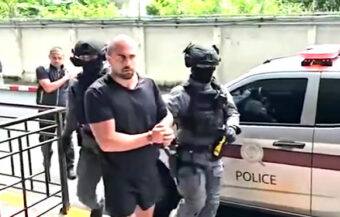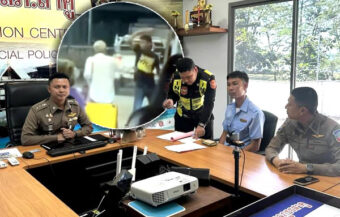Thailand faces political turmoil as legal action threatens to dissolve the ruling Pheu Thai Party, with claims of Thaksin Shinawatra’s influence at its core. As top scholars warn of instability, the country braces for potential government collapse.
Thailand’s government is presently living under the scare and threat of political instability. In short another legal torpedo has been fired which at this time could sink the Pheu Thai Party and the present government. The stakes were certainly raised substantially on Thursday when Mr. Therayut Suwankesorn made a substantial submission, over 5,000 pages long, with the Constitutional Court in Bangkok. The petitioner ultimately seeks the dissolution of the Pheu Thai Party, with the former street protest lawyer claiming it is de facto under the control of former Premier Thaksin Shinawatra.
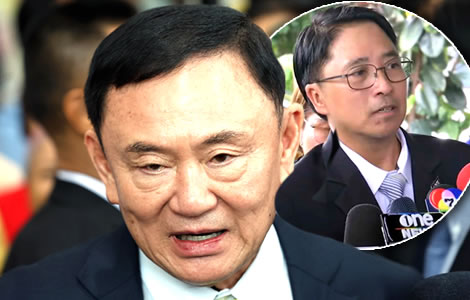
Top Thai legal scholars have expressed concern for the political stability of the country. It comes following the submission of substantial complaints against both the Pheu Thai Party and former Prime Minister Thaksin Shinawatra. A legal process which could see the ruling party dissolved began at the Constitutional Court on Thursday.
In short, the bombshell case was the reason behind a warning from the Secretary-General of the Palang Pracharat Party, Paiboon Nititawan. Earlier in the week, he told reporters, the government’s days were numbered.
The submission, reportedly over five thousand pages long, was previously made to both the Office of the Attorney-General (OAG) and the Ombudsman. The reported date for submission was September 24, 2024.
Claims that Thaksin is the de facto boss of Pheu Thai Party and allegations of government manipulation
The petitioner is Mr. Therayut Suwankesorn, a lawyer who formerly acted for popular street protest leader Phra Buddha Issara. At length, this was during the protest against former Prime Minister Yingluck Shinawatra in 2013/14. In turn, this lead to the 2014 coup d’état.
Significantly, Mr. Thirayuth, a respected and powerful lawyer, was responsible for the dissolution of the Move Forward Party this year. His claims that an attempt to amend Article 112 of the Criminal Code was an attempt to overthrow the state with the King as head, were at the heart of that matter. In turn, they were accepted by the Election Commission and Constitutional Court.
Kingdom plunged into political turmoil as PM Srettha is removed from office in a majority court decision.
Ung Ing or Paetongtarn Shinawatra is elected as Thailand’s 31st Prime Minister in a decisive vote in the House
Firebrand Jatuporn launches crusade against Thaksin Shinawatra and the present government in Bangkok
Ung Ing gets the nod and will be the sole candidate supported by coalition partners for Prime Minister
In brief, the new case makes similar claims regarding Mr. Thaksin Shinawatra and the Pheu Thai Party. While many legal experts and MPs within Pheu Thai claim the petition will fail, there is significant uncertainty. Undoubtedly, the Constitutional Court’s judgments have established wide boundaries of interpretation under the 2017 Constitution. Indeed, they have imposed extremely restricted scope on government ministers and political players.
In effect, being a politician in Thailand today requires extreme circumspection. Consequently, the ability to act or initiate bold initiatives has been impeded.
Nonetheless, some of the claims made by Mr. Thirayuth appear to hold merit. In particular, under the 2017 charter. In addition, much of what is claimed is openly reported in the country’s national press.
Thaksin Shinawatra’s role in present government decisions queried as evidence mounts in public domain
For instance, it is alleged that Thaksin Shinawatra is de facto the boss or controller of the Pheu Thai Party. This comes despite his daughter, Ms. Paetongtarn Shinawatra, being both the party leader and potentially Prime Minister.
In particular, the night of the Constitutional Court’s decision to oust a sitting Prime Minister. That was when PM Srettha Thavisin was ousted on August 14th last. Afterwards, Ex-Premier Thaksin Shinawatra appears to have directed the response by the Pheu Thai Party. Consequently, he played a decisive role in forming the present government.
Nonetheless, the Pheu Thai Party the next morning changed tack. Indeed, it pushed for his daughter, Ms. Paetongtarn, to become the next Prime Minister.
However, the petitioner claims that the presence of high-ranking ministers and decision-makers at Mr. Thaksin’s Thonburi residence on the night of the judgement demonstrates where power lies in the party. It will require evidence to prove the case, although much of it may already be in the public domain.
Accusations of Thaksin’s influence in avoiding staying one night in prison and ties to Cambodia examined
Also in the filing is a claim Mr. Shinawatra, through the Pheu Thai Party, held sway over the Corrections Department. Therefore, he was able to ensure that he did not serve a single night in prison. On August 22, the former premier was sentenced to eight years in prison and taken to Bangkok Prison or Klong Prem to serve his sentence.
Nevertheless, within hours, he was moved to the Police General Hospital in Bangkok. In his submission, Mr. Thirayuth refers to further evidence, including video clips. He also speaks of important witnesses that may be brought forward.
In short, he claims that this demonstrated an ability to control or overthrow the state’s power.
Furthermore, the suit identifies efforts by the Pheu Thai Party to cooperate with the People’s Party, the successor of the Move Forward Party, to amend and alter the 2017 Constitution. Of course, this claim has been openly questioned by legal scholars. In short, they argue it is part and parcel of normal parliamentary efforts.
At the same time, legal experts admit that the 2017 charter leaves wide room for the court to interpret acts. Certainly, this is what has happened in previous court decisions.
New complaint highlights Thaksin’s political power and links it to the expulsion of opposition parties
The fourth complaint is that Mr. Thaksin Shinawatra used his overarching power to expel the Palang Pracharat Party. Indeed, the party had been in the previous cabinet of Mr. Srettha Thavisin. In the new government Paetongtarn Shinawatra, it was expelled. Notably, a rump of the party’s MPs rebelled and put forward ministers.
Again, legal experts point to this as everyday judgment and the right of any Prime Minister to select a new cabinet.
At the same time, the suit touches on Mr. Thaksin’s close bond with former Cambodian leader Hun Sen. Previously, Mr. Paiboon of the Palang Pracharat Party had challenged in court the basis for talks between Cambodian authorities, led by Hun Sen’s son, Hun Manet, and the Pheu Thai-led government.
Indeed, Mr. Hun Sen made a high-profile visit to Chan Song La in Thonburi earlier this year. Significantly, this took place while Mr. Thaksin was still on parole. The lawsuit focuses on a controversial 2001 Memorandum of Understanding negotiated with Cambodia while Mr. Thaksin was Prime Minister.
The understanding details a path forward over disputed territories and seas which are reputed to contain vast deposits of gas or oil.
Top legal scholars express concern over government stability and Thaksin’s role in shaping policy
Finally, the complaint questions the substance of Prime Minister Paetongtarn Shinawatra’s September 12 policy statement to parliament. It notes that the speech bore more than a passing resemblance to an earlier address by Mr. Thaksin. This address was given to a business conference in Bangkok on August 22nd last.
The top scholars who this week expressed concern at these developments are Mr. Munin Phongsapan, Lecturer, Faculty of Law, Thammasat University, and Mr. Yuthaporn Issarachai of the Department of Political Science at Sukhothai Thammathirat Open University.
Both have expressed reservations about the wide scope of the court’s interpretations of what overthrowing the democratic regime with the King as head of state means.
Under Section 49 of the Constitution, a complaint can be made by any citizen. First, they must refer their submission to both the Office of the Attorney-General (OAG) and the Ombudsman. However, if no action is taken within 15 days, they can bring their case to the Constitutional Court.
Move Forward Party’s dissolution sets precedent as Thaksin and Pheu Thai Party face legal scrutiny
This was the route that saw the dissolution of the Move Forward Party in August. Afterwards, it was a complaint from the former Senate through the parliamentary President’s office that saw the court take up the case of former Prime Minister Srettha Thavisin. Certainly, he was ultimately removed.
Nonetheless, in the latter case, it is thought that both Mr. Thaksin and Pheu Thai MPs blame Palang Pracharat Party leader General Prawit Wongsuwan. The former deputy prime minister is known to be a powerful figure. Indeed, he boasted before last year’s election that he knows the inner workings of Thai governance. In addition, he told reporters he knows who brings about coup d’états in Thailand.
Undoubtedly, the current situation leads to political instability. Indeed, the tensions are already leading to alienation between the Pheu Thai Party and the Bhumjaithai Party in government. The latter is, in effect, resisting any effort to amend both the Constitution and the Political Parties Act.
Sections 28 and 29 of the Political Parties Act 2017 now come into focus. These are the provisions that allow for the Constitutional Court to dissolve a political party.
Political Parties Act in spotlight as government seeks to address growing threats to political stability
If the Constitutional Court takes up Mr. Thirayuth’s case, it may eventually issue a judgment. After that, a further complaint is brought to the Election Commission. At this point, it decides to dissolve the offending political party and goes back to the Constitutional Court to seek such an order.
Therefore, amending the Political Parties Act may become a top priority of the present government. Certainly, it may be easier than amending the 2017 constitution, particularly with the Bhumjaithai Party’s de facto control of the Senate or upper house.
Undeniably, the dissolution of the Pheu Thai Party would plunge Thailand into the abyss in terms of political instability. Yet that could well be an accurate prediction given the strength of the case being proposed. In addition, given the past track record of the Constitutional Court, particularly its wide and consequently restrictive interpretations of the terms of the 2017 Charter.
Legal scholars warn of broad interpretations as Thai economy and political stability have suffered since 2006
Mr. Yuthaporn of Sukhothai Thammathirat Open University this week admitted that for the last two decades, Thailand has suffered under ‘legal war’ in this fashion. He described the situation as destructive.
Meanwhile, Mr. Munin of Thammasat University was of a similar mind. He argued that the charter and legal provisions were too broad. In particular, he suggested that the overthrow of the state must mean violent or physical actions being undertaken.
Therefore, he warned that public confidence in the government and rule of law in Thailand is potentially left very shaken. In truth, political instability since 2006 has cost Thailand’s economy dearly.
At the same time, this case immediately impacts confidence in the government and its ability to provide consistent and harmonious administration of the kingdom.
Join the Thai News forum, follow Thai Examiner on Facebook here
Receive all our stories as they come out on Telegram here
Follow Thai Examiner here
Further reading:
Firebrand Jatuporn launches crusade against Thaksin Shinawatra and present government in Bangkok
Political storm brewing as the country’s leading parties struggle to reform the 2017 Constitution
Prime Minister Paetongtarn is the people’s favourite for the top job according to latest NIDA poll
Government is already divided as the PM shelves efforts at amending the 2017 Constitution on ethics
People’s Party on campaign but on guard against potential legal complaints to oversight agencies
Wealthy young People’s Party leader aims to create a technology-driven and efficient welfare state
Inward immigration may ultimately be the only thing that can halt Thailand’s fated economic decline
Thailand’s days of GDP growth in excess of 5% may be a thing of the past as it has grown too old
Cabinet in pension move as the number of working Thais to over 60s is set to half in 20 years

